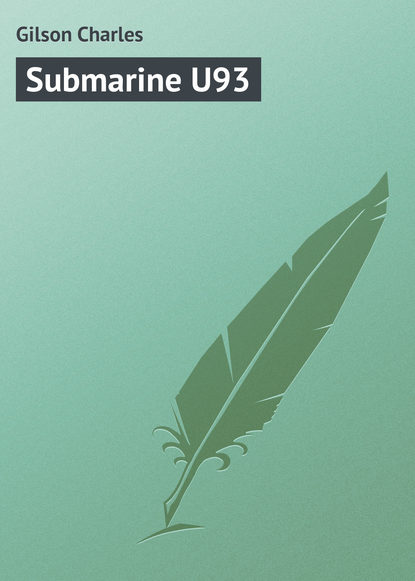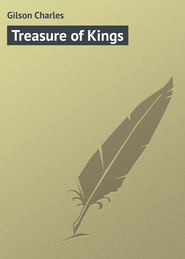По всем вопросам обращайтесь на: info@litportal.ru
(©) 2003-2025.
✖
Submarine U93
Настройки чтения
Размер шрифта
Высота строк
Поля
"There should be a woman here," said he; "a Mrs. Wycherley."
"She's gone out," said Crouch.
The old man smiled and pointed with his stick.
"Why, there she is!" he exclaimed. "How strange that I never noticed her before."
He had pointed to the armchair, at the other end of the room, in which Crouch had formerly been seated. The whole thing was so cleverly planned, the old man's voice was so dulcet and confiding, and his expression of surprise so admirably feigned, that Crouch could not resist the wholly natural impulse of turning round, to see for himself whether or not Mrs. Wycherley were there.
His eyes had not left the old man's face for longer than the fraction of a second before there took place a kind of transfiguration which was even more terrible to see than it was surprising.
There had been something about the patriarchal figure of the old, white-bearded man that was gentle, beneficent and charitable. His expression had been that of one who looks upon the world, and all its fooleries and foibles, with the comfortable tolerance of age. On a sudden, this expression changed. His eyes flashed; his brows became knit in a savage frown. At the same time, this transformation extended to his body, which straightened, quivered, and even seemed to grow larger. Before it was possible to guess what he was about to do, or make the slightest movement by way of self-defence, he had raised his heavy ash-plant high above his shoulder, and brought it down with a crashing blow upon the head of Captain Crouch.
The little sea-captain had been taken unawares. Once again had he been fooled. He let out a groan, spun round like a top, and then came down heavily upon the floor.
In so short a space of time did this calamity occur that Jimmy Burke had barely time to act. He had taken two steps forward, and had got so far as drawing his revolver from his pocket, when he was seized and held fast in the powerful arms of the two younger men. Before he had time to cry out, or even to realize what had happened, he found himself not only with a gag thrust into his mouth, but with both hands handcuffed behind his back.
Russell laughed aloud, in a voice that was far from dulcet.
"I saw through your disguise," he cried, pointing to the prostrate figure of the little captain, "the very moment I entered the room. Something more is needed than a white bowler hat and a scarlet necktie to conceal the identity of Captain Crouch."
At that, Crouch struggled to his feet, and stood for a second swaying. Then, with a loud cry and a kind of lurch forward, he flung himself like a wild-cat upon the old man, whom he seized roughly by the throat.
"You villain!" he shouted at the full power of his lungs.
So great was his passion, so amazing his agility, that there is little doubt he would have strangled the old villain then and there, had it not been for the two younger men, who hurled themselves upon his back.
They dragged him away as though he had been a mad dog, but not until he had seized Russell by his long, flowing beard, which he tore, not piecemeal, but bodily, in a mass, from the old man's wrinkled face.
A moment later, Crouch, like Jimmy Burke, stood handcuffed. Panting, literally foaming at the mouth, he glared at his assailant. And as he glared, it was as if his single eye grew larger in his head. His thin lips parted, though not a word escaped him; it was as if amazement had struck him dumb.
The truth was, he found himself confronted by the most surprising part of an incident which, from start to finish, was at once unlooked-for and bewildering. For, the old man, bereft of his spectacles and beard, stood before Crouch discovered and confessed; and in place of the grey and patriarchal features of the so-called "Mr. Russell" was the seamed and weather-beaten countenance of Rudolf Stork.
CHAPTER XIX-A Clue
It may seem surprising that our good friend Captain Crouch (who was very far from a fool) should have been gulled so successfully, and on no less than two occasions, by Rudolf Stork. It must not be forgotten, however, that Stork had been an actor, who knew well not only how to disguise himself, but how to change his voice, and the expression of his face, and to assume those habits and little mannerisms by which personality is made evident. He not only looked the part of an old dry-as-dust professor, but acted up to it so cleverly that both Crouch and Jimmy Burke were quite deceived.
When he found himself overpowered and handcuffed, when he saw how completely he had been duped, Captain Crouch could not conceal his rage and mortification. He shouted at the full power of his lungs, in a vain hope that some one would hear and hasten to his help, forgetful for the moment that the building was utterly deserted, that Mrs. Wycherley was not likely to return.
In any case, Rudolf Stork was not the man to run unnecessary risks; his case was altogether desperate. To silence Crouch by means of a gag, accompanied by a vicious kick in the ribs, was a task of not much difficulty, nor one that took longer than a minute at the most.
Stork then rose to his full height, and placing both arms akimbo, looked down upon his victims, who lay side by side upon the floor.
"If I had killed you out of hand," said he, "you'd have nothing but your own cleverness to blame. You should have learnt by now to let sleeping dogs lie. Let me tell you this, Captain Crouch, as one sailor to another: you set foot on dangerous ground the moment you thought fit to interfere with me."
Going down upon a knee, he turned out their pockets, finding first the keys which Crouch had obtained from Mrs. Wycherley, and then the brace of revolvers that they had purchased that very morning.
"You came prepared, I see," he grumbled. "It's just as well I thought to disguise myself, or, like as not, I should have been shot on sight."
And then, in the inner pocket of Crouch's coat, he discovered the letter written by "Valentine" in German, which had come in a sealed envelope from the "Hotel Magnificent." Without a word, he read it to the end, and then, folding it carefully, put it away in a letter-case which he kept in a hip-pocket along with a jack-knife large enough to cut a loaf of bread.
"The fat's in the fire," said he, turning to his companions; "there's no doubt as to that. These fellows know more than is good for them. We must put them out of the way. It's a nasty business, but war's war, and those who employ me don't stick at trifles, such as the life of a tramp skipper and a stowaway."
At that, one of the younger men lifted a hand-a quick, nervous gesture, denoting at once surprise and consternation.
"Kill them!" he exclaimed.
"There's no other way," said Rudolf Stork.
"I don't like it," said the other.
The third man now spoke for the first time. "It would be madness," said he, "and a cold-blooded business as well. We can leave them here, handcuffed, gagged, and with their feet bound tightly."
"There's the old woman," said Stork. "She'll find them for a certainty before twelve hours are past. For myself, I take no risks."
"I'll not be a party to it," said the man who had spoken first.
"Then you're a fool," cried Stork. "You fail to realize the gravity of the business. A raid has been planned on the North Sea coast, and these two know all about it. In any case, the raid will take place, there's no time now to stop it; and if the British Admiralty is warned, the result will be disastrous. Whatever happens, the lips of these two men must be closed, for five days at least." Then on a sudden, he changed his voice and slapped a hand upon his thigh. "I've got it!" he exclaimed. "Valentine purchased the whole of this building, on behalf of the German Secret Service, in order that we should have no eavesdroppers in the way of next-door neighbours. I've got the keys here. We'll lock them both up in one of the empty flats, the one on the top floor for choice. There, they'll be well out of the way, and as good as dead."
This idea commended itself to both the younger men. It was eminently safe, and presented not the least difficulty. Also, it had the advantage of evading the terrible responsibilities of wilful murder.
Accordingly, the two captives were carried up to the top storey of the building, where, after their legs had been tightly bound, they were locked up in an empty room. Here not even Mrs. Wycherley would find them. From the amount of dust upon the floor and windows, and the innumerable cobwebs suspended from the ceiling, it was evident that no one had entered the flat since the very day upon which the last tenant had left it. Even had Crouch and Jimmy not been gagged, and had they shouted till they were hoarse, they could never have made themselves heard. Neither was there any possible means of escape. They were shut up in a room which had once been used as a bedroom, and the hall door of the flat was locked from the outer side. The only window-which was quite small-looked out upon the roofs and chimney-pots of the adjacent houses several feet below.
Since Stork and his companions could afford to waste no time, the whole of this dastardly business was carried out quickly and in silence. And in less than ten minutes after the suggestion had been made, Crouch and Jimmy Burke were left alone, listening to the receding footsteps of the German spy and his confederates growing fainter and fainter as the three men descended flight after flight of stairs.
The thoughts of a man who finds himself in such a situation cannot be of the pleasantest. What Crouch's were, no one is ever likely to know, since-for very shame, perhaps-he ever afterwards kept them to himself. As for Jimmy Burke, he felt then, and quite believed, that from the very days of his boyhood, his life, and every enterprise he had ever undertaken, was doomed to failure. So far, nothing had gone well with him; and now that his fortunes were bound up with those of Captain Crouch, it seemed that he was to lead even the little sea-captain-hitherto so masterful-along the straight and certain path to unmerited disaster.
There are moments in the lives of us all when despondency obscures our outlook upon life, in much the same manner as a thunder-cloud darkens a summer sky. And yet, we should learn that Hope can remain with us to the last. We can no more foresee the actions of other men that influence our own lives-often indirectly-than we can foretell the dispensations of Providence itself. Always, we are in God's hands; it behoves us to act like men, and put our trust in Him.
It is possible to become so hopeless that we deliberately turn our backs upon the brighter side of things; and this is what goes by the name of pessimism. And now Jimmy Burke, giving himself up for lost, was quite unable to remember that there still existed a very great possibility that both he and Captain Crouch would be discovered.
Indeed, not more than ten minutes had elapsed after Stork had taken his departure, when suddenly the whole house was made to echo with a dull, thudding sound, as if some one were banging on a door. This noise continued without ceasing for at least five minutes. It appeared to proceed from the lower part of the building. At first, the boy could not think what it was; and then, on a sudden, like a bright flash of light in the midst of all the gloom of his despondency, he remembered that Crouch had rung up Scotland Yard, and that in all probability it was the police themselves who were below.
Apparently the same thought occurred to Crouch, for the little captain made a sudden and desperate effort to free himself; and presently, by some means or other, he managed to stagger to his feet, only to fall once more prostrate to the ground.
For all that, he was not one to admit that he had failed so easily. He got to his feet again, stumbled across the room and threw all his weight upon the door.
Captain Crouch was neither tall nor heavily built; he could not have weighed more than nine stone; and, naturally enough, he failed to break open the lock-even if that had been his intention. He fell to the ground a second time, bruised and out of breath; but there was a possibility that the noise had been heard by those who were within the building.
For some seconds they waited in suspense, listening intently, silent and quite helpless. And then, they heard footsteps on the stairs, and the sound of voices, and some one trying the doors.
Crouch got to his feet again. He could not cry out because of the gag that was still fastened in his mouth. He had no other means of making his whereabouts known than the method he had tried before. Again he threw his weight upon the door and fell heavily to the ground.
This time there could be no doubt that he had succeeded in his purpose. A man came to the outer door of the flat, tried to open it and failed, and then called out in a loud voice, asking who was within.
Neither Crouch nor Jimmy could answer. It must also be remembered that the room in which they were imprisoned was quite dark, save for the fact that a full moon had arisen which had cast upon the floor a square pattern criss-crossed by the shadows of the framework of the window. Since the flat was quite unfurnished and the walls of the passages were bare, human voices were magnified in sound, and it was possible to hear quite distinctly what was said by those outside the door. The voice of one man was particularly distinct. Not only was it louder than the others, but its tones were authoritative; it was he who gave orders to those who were with him. As they guessed from the very first, this was Superintendent-detective Etheridge-a man whose reputation in his own line of business was second to none.
"Go on, man!" he exclaimed. "Break the door down. There's no time to waste trying to force the lock."









